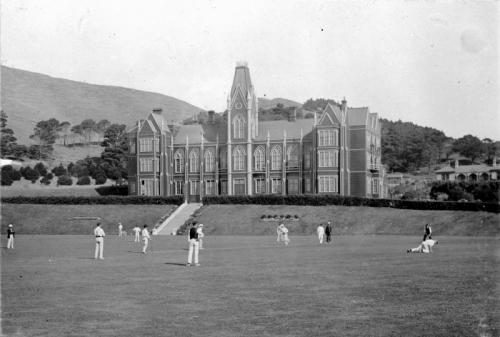See historic events for any day of the year by entering the date below. Why not try your birthday?
Wellington College and the war in Belgium

The impact of the First World War on local communities and institutions such as clubs and schools is starkly illustrated by the experience of Wellington College. During the war 1643 of this school’s former pupils served overseas. Of these, 222 were killed – 40 of them in Belgium – and a further 350 were wounded. Many of these young men had but a few years earlier sat in classrooms or played on the sports fields of their old college on the slopes of Wellington’s Mount Victoria. More ...
Turning boys into soldiers
Looking at a typical school photograph today, it is hard to imagine many of those in the picture marching off to war anytime soon. Yet this was the reality for more than 100,000 New Zealanders who served overseas during the First World War. The foundations for their participation had been laid at school through the cadets and through organisations such as the Boy Scouts. More ...
A headmaster's vigil
The First World War had a major impact on Wellington College’s teachers, many of whom had developed close relationships with their students. Ten members of staff served overseas, and one was killed. War took an especially heavy personal toll on the school's principal, J.P. Firth. ‘The Boss’, as he was known, wrote to every former pupil who served overseas – and to the families of each of the 222 old boys who were killed. More ...
Medals and memories
As is often the case in war, some people are singled out for extra praise and recognition for their efforts. They receive medals and accolades or are immortalised in the name of a school shield or cup. Many of these men would be the first to point out that they were not necessarily better or braver soldiers than their comrades. Luck and circumstances played a big part in whether someone was recognised as a hero or not.
Wellington College contributed its fair share of heroes to the war effort. Alongside the 576 old boys who were killed or wounded, 202 were decorated or mentioned in dispatches. More ...
Douglas Harle
A fine scholar and sportsman, Douglas (Dougie) Harle was one of Wellington College's outstanding pupils in the years immediately before the war. He was killed during the Passchendaele offensive in October 1917 – one of 18 College old boys who lost their lives in Belgium that terrible month. While the remains of many men were never recovered, Harle's body was buried in the immaculately maintained Dochy Farm Cemetery. More ...
Alexander Turnbull Library, Wellington, New Zealand
Reference: 1/2-106902-F
Further information and copies of this image may be obtained from the library through its 'Timeframes' website, http://timeframes.natlib.govt.nz.
Permission of the Alexander Turnbull Library, National Library of New Zealand, Te Puna Matauranga o Aotearoa must be obtained before any reuse of this image.
Well spotted Gary. According to the Auckland War Memorial Museum Cenotaph database Douglas Harle's embarkation unit was the 23rd Reinforcements Canterbury Infantry Regiment, C Company. His last unit was indeed the Wellington Infantry Regiment.
Just looking at the entry of Doug Harle WW1 from Wn College.
The commentary says he was from the Canterbury Regiment yet he was from Wellington and his headstone (pictured) says he was in the wellington Regiment?






 Delicious
Delicious StumbleUpon
StumbleUpon Reddit
Reddit Facebook
Facebook Google
Google Yahoo
Yahoo


Community contributions